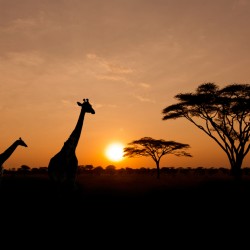When to go to Tanzania

Tanzania is one of the best tourist destinations in all of Africa. The country is located in East Africa bordered by Kenya in the North in Zambia and Mozambique in the South. Tanzania is bordered by the Democratic Republic of the Congo on the west side and features a spectacular coastline along the Indian Ocean on the east.
Tanzania is home to 3 of Africa’s 7 natural wonders including Mount Kilimanjaro, Ngorongoro Crater, and the Serengeti migration. Although the migration is a shared wonder with Kenya, the majority of the migration is experienced within the country. Another highlight of the country is the spectacular beaches of Zanzibar.
When to go to Tanzania
The best times to visit Tanzania occur during the months of January and February, and between the months of June, July, and August. Visitors will find that selecting one of these months for visiting Tanzania will deliver the best options for exploring almost any part of the country.
When to go to Tanzania: Weather
Tanzania is near the equator which means that the temperatures only fluctuate a little. The coolest months are June, July, and August with daytime temperatures around 27 to 28°C. The warmest months occur from November through February where temperatures reach as high as 35°C.
Tanzania does not experience discernible seasons like winter, spring, summer and fall. Instead visitors planning a trip to the country should consider the various rainy and dry seasons before choosing their months to come. The first rains, often referred to as the short rains, occur from mid-October to late December. The heavier and longer range occur during the months of March through May. It is quite possible that you will find a desired resort or area closed because of these heavier rains. Parks often limit what access you have in order to protect the roads of the park.
The best dry seasons to explore Tanzania occur in January and February, and the months of June, July, and August. January and February 10 to be warmer which makes for a better climate to climb Mount Kilimanjaro and to explore the top rim of Ngorongoro Crater. The latter dry season is cooler making safaris in the Serengeti, Ngorongoro Crater, or one of Tanzania’s other national parks a little more comfortable. The evenings during this part of the year can be a little cool and may warrant a light jacket.
When to go to Tanzania to climb Kilimanjaro
Visitors connect trek up Kilimanjaro in either of the dry seasons but the best time to climb is probably during the months of January or February. The temperatures are little warmer making the upper elevations easier to enjoy. However please note, the summit can be freezing or below any time of year.
When to go to Tanzania for Safari
Tanzania offers some the most spectacular encounters with wildlife through the Serengeti, Ngorongoro Crater, or the Selous game reserve. The months of June, July, and August feature cooler days making a Safari outing more comfortable, but following the rains the water is plentiful which enables the wildlife to be more scattered throughout the parks.
The dry season months of January and February following the short rains represent the best time to visit Tanzania for experiencing wildlife. This is the hottest time of the year and there’s a greater probability that wildlife will be congregated around watering holes and riverbeds. You’ll have a good chance of seeing large herds together versus scattered across the plains. These months also feature a calving season for the wildebeest. New life, featuring baby zebra, wildebeests, and warthogs, will be witnessed throughout the national parks.
The famous Serengeti migration is occurring throughout the year however the herd can be easily experienced in the plains of the Serengeti during the months of January and February. One of the highlights of the migration occurs when the herds crossed the Mara River into Kenya and the Masai Mara. Although there is no specific date, this usually occurs sometime between mid-September to mid October. This is an exciting time as wildebeests and zebras by the currents of the river along with the hungry crocodiles waiting for kill.
Birdwatchers will have the best experience visiting Tanzania between the months of October through April. It is during these months that many birds migrate from Europe to this part of Africa. Although it can be hampered by the rain this is a great time for bird watching.
When to go to Tanzania for the beaches
The best time to visit Tanzania for the beaches is during the months of January and February when the hot sun makes the cool breeze and ocean waves more enjoyable. However, the temperatures are consistent enough that visiting Zanzibar and the beaches is possible any time of the year. However if your reason to go to Tanzania is for Zanzibar and the beaches you should probably opt to avoid the long rainy season between March through May.
When to go to Tanzania: More Info
When To Go always recommends exploring other sites and resources to learn more about any destination you wish to visit. You can learn more from the Tanzania Tourist Board.
